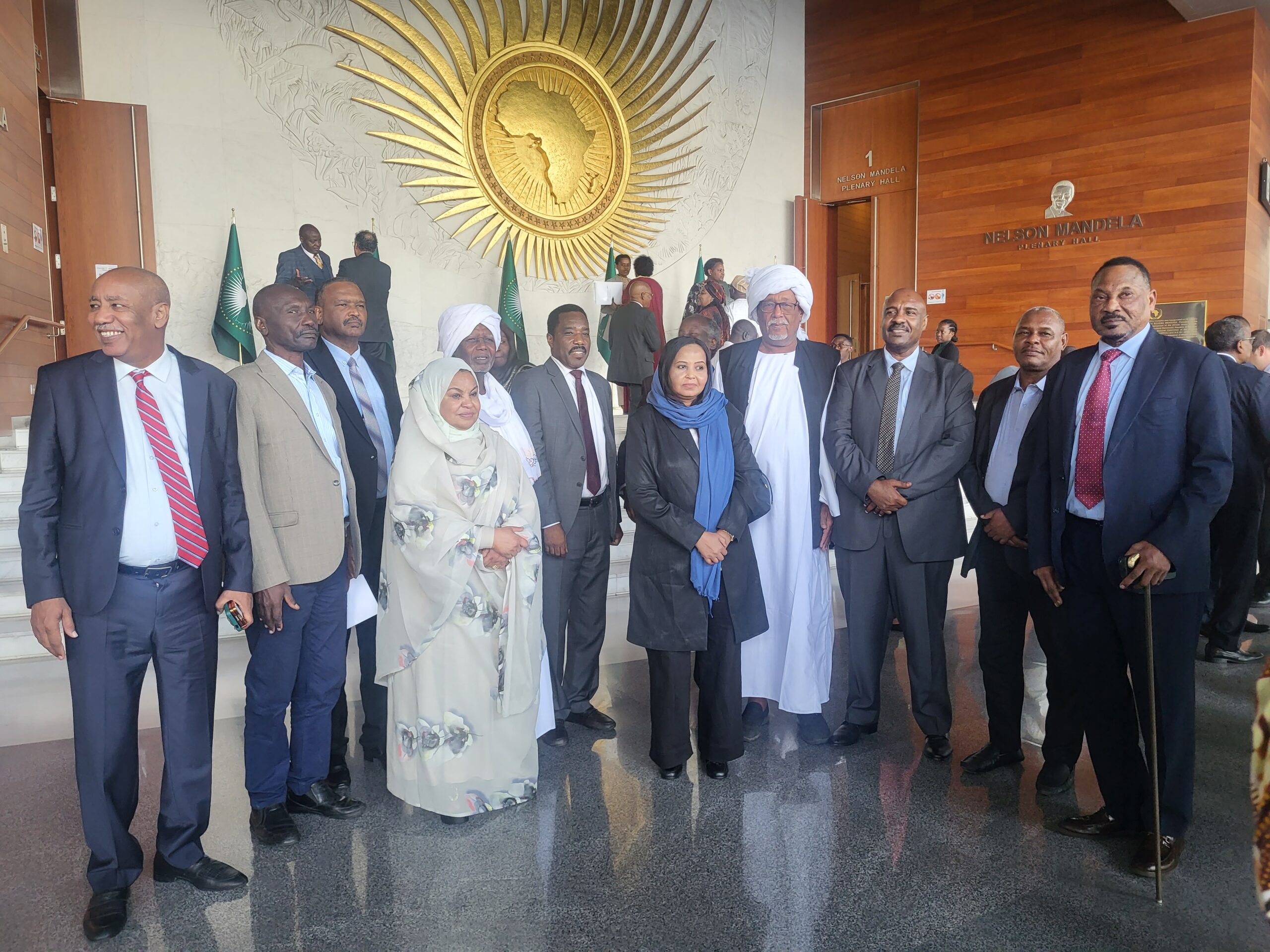At the African Union, a second bloc of civilians opposing the war
17 July 2024
From July 10–15, 47 Sudanese from different groups met under the auspices of the African Union and IGAD in another regional bid to end Sudan’s now 15-month-long war.
The meeting marked one of the first major initiatives by the African Union (AU) to address the conflict between Sudan’ army and paramilitary Rapid Support Forces that have displaced millions and ravaged the country. This is partly due to the army leader, Lt-Gen Abdelfattah al-Burhan’s opposition to the AU after the pan-African body renounced Sudan’s membership for instigating a military coup in October 2021.
For nearly two hours, Sudanese civilians, diplomats, and journalists waited in the vast hall of the African Union’s (AU) headquarters. Last-minute debates about the drafting of the roadmap delayed the closing ceremony scheduled for Monday morning. The Intergovernmental Authority on Development (IGAD) and the African Union (AU) co-organised a preparatory meeting for an intra-Sudanese debate the day before, and 47 Sudanese participants left the AU’s headquarters at almost one in the morning. Eventually, a plan to increase participation for other parties to join the dialogue and a post-conflict roadmap was developed.
The disagreements mainly focused on the type of transitional government—political or technocratic—as well as the exclusion of the National Congress Party (NCP) of former President Omar al-Bashir from the dialogue.
Except for the former Sudanese ambassador to the United States, Nureldin Satti, who led the AU discussions with a neutral stance, nearly all other participants readily admitted their support for the army. Representatives of the Rapid Support Forces were not invited and members of civil anti-war coalition, “Taqaddum”, along with other groups, refrained from attending. Some civil actors told Ayin they did not attend since they feared the presence of NCP members at the meeting.
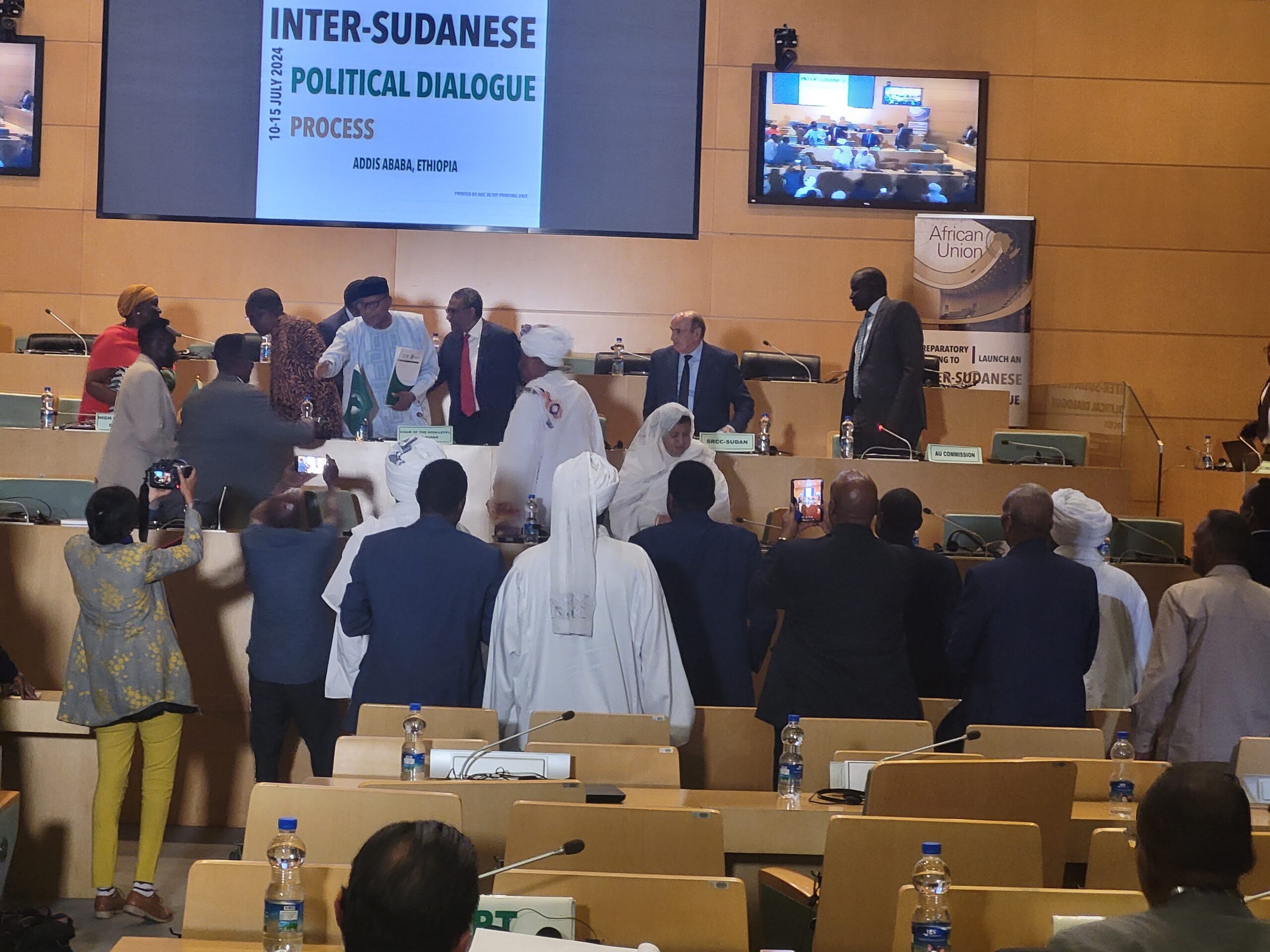
Bitter Enemies
“I am against the policy of the empty chair. When I am invited, I come. You don’t dialogue with your friends but with your rivals and even with your enemies,” Satti explained in response to the reluctance of his friends from Taqaddum to attend. Merely mentioning the coalition’s name drew ire from the new pro-peace entity formed under the auspices of the AU and IGAD.
In October 2023, the Forces of Freedom and Change, representing the ruling coalition during the revolution, formed a broader alliance with civil and trade union forces under the umbrella of Taqaddum, appointing former prime minister Abdalla Hamdok as the coalition leader.
“Some of these civilians encouraged the SAF and the RSF to carry out the coup d’état on October 25, 2021, while others condemned this coup. That’s when the political class split became more pronounced. The two camps then became bitter enemies,” summarised Nureldin Satti to Ayin after the closing session.
Many have since joined Taqaddum, which, despite claiming neutrality, was seen by participants in this mid-July meeting as the civilian face of the paramilitaries.
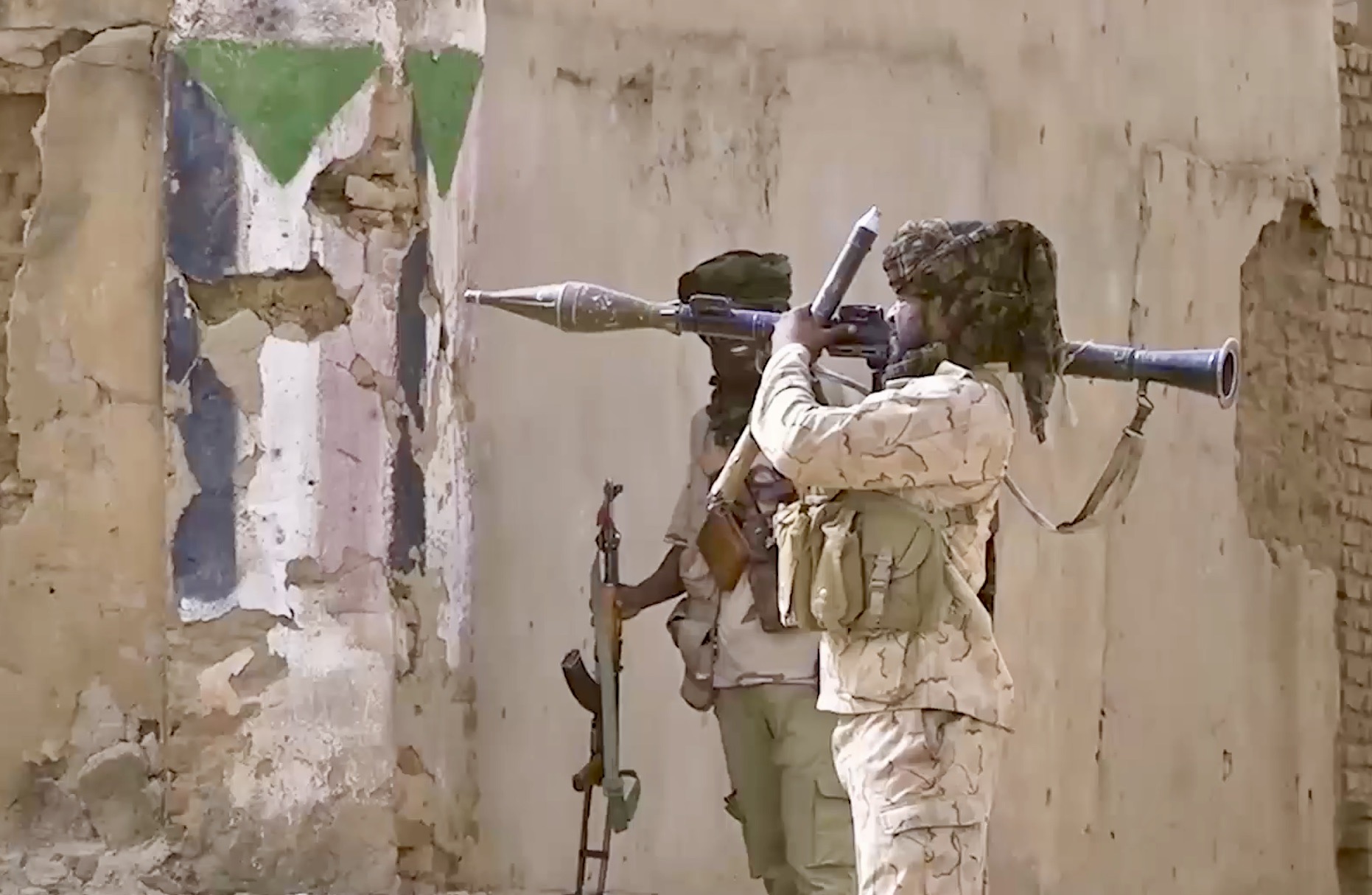
“The Rebellion of the Rapid Support Forces”
“The sole objective of Taqaddum members is to return to power, even though they did nothing during the interrupted democratic transition. Many of these politicians lived abroad and took over our revolution,” denounced Magdah Abdelrahman, representing the Sudanese National Women Alliance.
Another point of contention among participants was the public condemnation of the RSF without any criticism drawn towards the army. Former Ambassador Satti refused to be associated with such a statement, as did AU and IGAD officials.
Finally, “14 Sudanese blocs” created a text that calls for maintaining Sudan’s unity, ending the war as a top priority, and denouncing the “serious violations” the RSF has committed. After internal negotiations, countries supporting the paramilitaries were not named.
The AU nevertheless intends to include the missing factions in a future intra-Sudanese dialogue, despite Taqaddum members accusing them of having close ties to the SAF and NCP Islamists. “This particular meeting is part of a series of consultations that will be organised with other Sudanese political and civil actors who could not participate this time,” said Mohamed Ibn Chambas, Chair of the AU’s high panel tasked with resolving the Sudanese crisis.
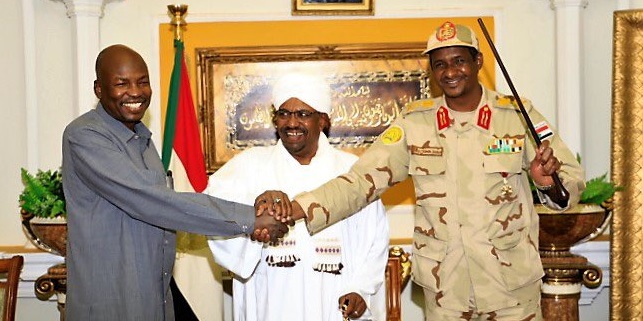
Allies of the Former Regime
Many had declined the invitation due to the presence of people close to the previous NCP regime. Two former Bashir ministers attended the meeting: Bahar Idriss, a Darfur rebel turned health minister in 2011 and Ishraga Sayed, head of the Democratic Unionist Party’s steering committee, appointed minister of international cooperation the same year. Also included were journalist Gamal El-Deen Angra and intellectual Mohamed Mahgoub Haroun, both linked to Islamist currents. “The positions taken at this meeting towards the Islamic Movement and the NCP are weak and open the door for their reorganization and emergence under new names,” warned a diplomat.
Former Darfur rebels Mubarak Abdelrahman, aka “Mubarak Ardol,” ex-director of the Sudanese Mineral Resources Company, and Abdelaziz Nour Khalil, the half-brother of Finance Minister Gibril Ibrahim, dismissed these concerns by recalling their long fight against Islamists, which, according to them, would prevent any collaboration with those nostalgic for the Bashir era.
“I haven’t changed my mind,” emphasised Al-Tayeeb Mohamed, a member of the Sharg An Neel Resistance Committee in northern Khartoum. “The army must stay out of power. All militias must be dismantled, not just the RSF but also those who attended this meeting alongside us!”
Yet, Islamists within the army have continuously hindered any mediation attempts, not eager to resume a potential democratic transition. “There is no truce, no negotiation, even if the war lasts a hundred years,” declared SAF Commander-in-Chief Yasser al-Atta on July 15 from Omdurman. Meanwhile, the UN is attempting indirect exchanges between SAF and RSF delegations in Geneva.
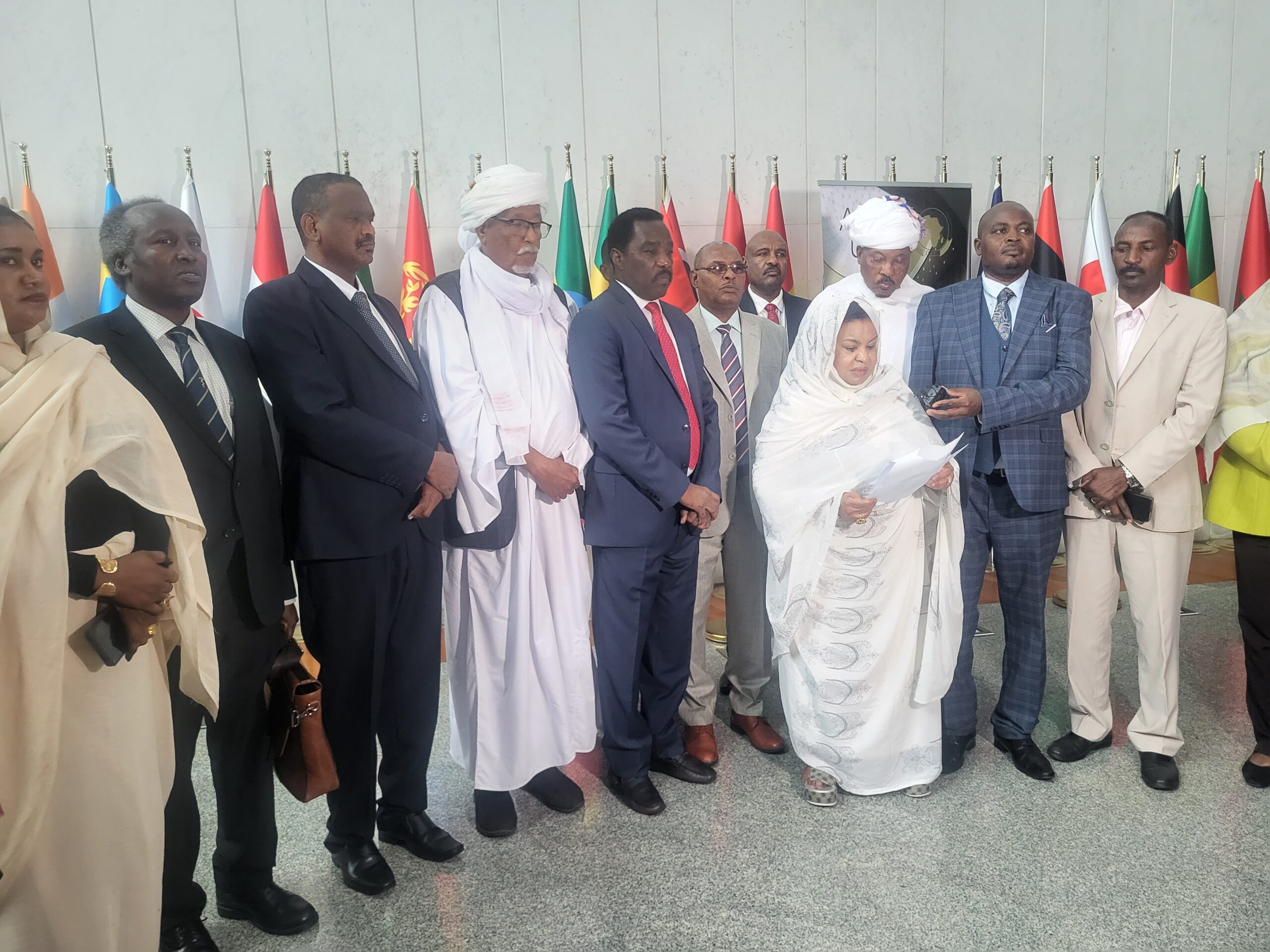
Fear of the Libyan Scenario
At the AU headquarters, a similar session to the one just concluded should be organised soon, a representative of the pan-African body told Ayin. The upcoming task promises to be arduous. “If Taqaddum had participated in the meetings, the extreme differences among civilians would have prevented the meeting from concluding and producing results,” claimed the diplomat, recommending organising discussions with a limited number of representatives from different factions. According to her, this is the only way to pressure the two belligerents and their allies driven by political ambitions.
Several participants reported having spoken with Taqaddum representatives on the sidelines of the AU summit. The two camps had already met at a conference in Cairo on 6 July without managing to sign a joint declaration due to the lack of explicit condemnation by Taqaddum members of the crimes committed by the RSF. While both warring parties certainly affirm their opposition to the war, the chasm between them still seems insurmountable. “The Libyan scenario is not excluded,” concluded political science professor Bashir El-Shariff, in reference to the north African country’s long divide between two rival administrations.


